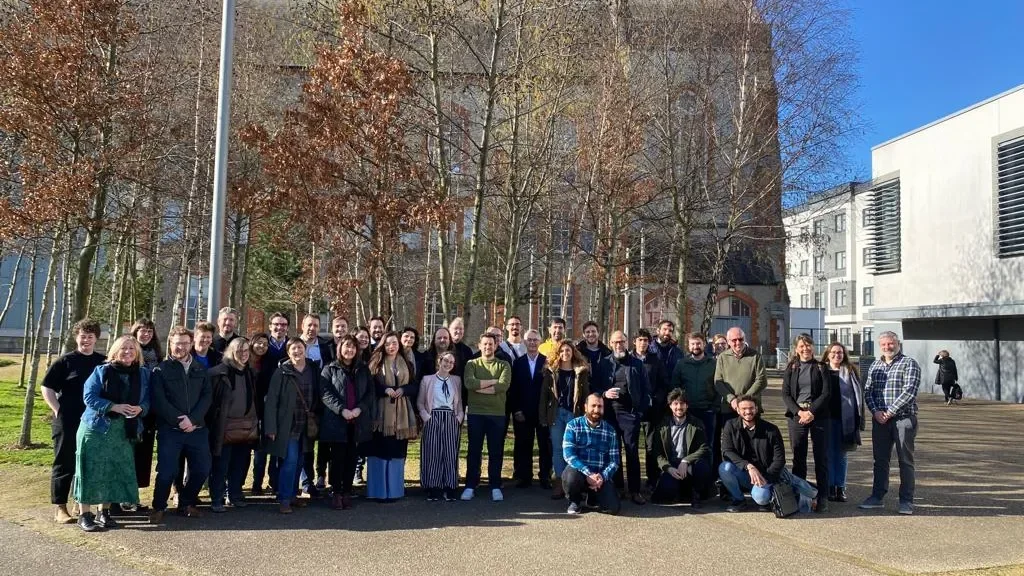

SignON project win SFI Engaged Research of the Year Award 2023
This week, Science Foundation Ireland has announced the winner of their Engaged Research of the Year 2023 Award: the SignON project, co-ordinated by Professor Andy Way from the DCU School of Computing. SignON aims to bridge the communication gap between Deaf, Hard of Hearing (DHH) and hearing people through the creation of accessible translation services powered by state-of-the-art artificial intelligence.
The project’s aims include the development of a free, open-source service and framework for conversion between video, audio and text, translating between sign and spoken languages, delivered to users via an easy-to-use mobile application. The SignON EU consortium includes 17 European partners, including the European Union of the Deaf (EUD), and the project focuses on Irish Sign Language (ISL), British Sign Language (BSL), Sign Language of the Netherlands (NGT), Flemish Sign Language (VGT) and Spanish Sign Language (LSE), as well as the English, Irish, Dutch and Spanish spoken languages.
The project is supported by the European Union's Horizon 2020 Research and Innovation Programme, and is based in the ADAPT SFI Research Centre for AI-driven Digital Content Technology, which Prof Way co-founded and where he acts as Deputy Director.
SignON uses a co-creation approach to research, which involves ongoing engagement with DHH and hearing groups through surveys, focus groups, round table discussions, workshops, and creative events.
The work being conducted in SignON represents a shift in the field of sign language technologies, offering an inclusive, co-created, and ethically responsible solution to the historical challenge of communication between signers and non-signers. SignON’s innovative approach ensures that DHH communities are not just subjects of but rather active participants in the research and development process.
Speaking about the importance of research engagement, Prof Way said:
With SignON, we are aiming to break down barriers and facilitate communication between the deaf, hard of hearing and hearing communities. I first started working on sign language machine translation over 15 years ago, when co-creation opportunities were far more limited. SignON demonstrates that we can increase inclusiveness at every level of research - from early objectives to development to delivery - to benefit everyone and make a real difference.
Dr Elizabeth Mathews, Associate Professor with ADAPT and the School of Inclusive and Special Education at DCU, also spoke about the project’s collaborative approach:
This award recognises the innovative and collaborative work of the extended SignON team, especially the Deaf experts who have led on community engagement elements of the project. It’s not easy to bring people with such diverse academic backgrounds to the same table to make something happen, but this project demonstrates that when it does, the results are worth watching!
Dr Shaun O'Boyle, Research Fellow with ADAPT and the School of Inclusive and Special Education spoke about the scope of the project:
The award celebrates a contemporary approach to Engaged Research at DCU. With incredible leadership from European Union of the Deaf and Vlaams Gebarentaalcentrum (The Flemish Sign Language Center), we have been able to try new things - such as theatre and performance - and to collaborate with engagement experts in ADAPT on creative events and community discussions.
Frankie Picron, Project Manager at the European Union of the Deaf (EUD) spoke about the impact of the project:
EUD believes in the benefits of community building and takes pride in witnessing the outcomes of the co-creation efforts in SignON, which cultivate a collaborative environment where the synergy of diverse perspectives, both hearing researchers and deaf communities, fortify unparalleled collaboration, innovation and mutual understanding. Our dedication to engaged research is reflected in its transformative impact on innovation and community building. This award recognises the value of real co-creation and encourages further forays into such processes.
